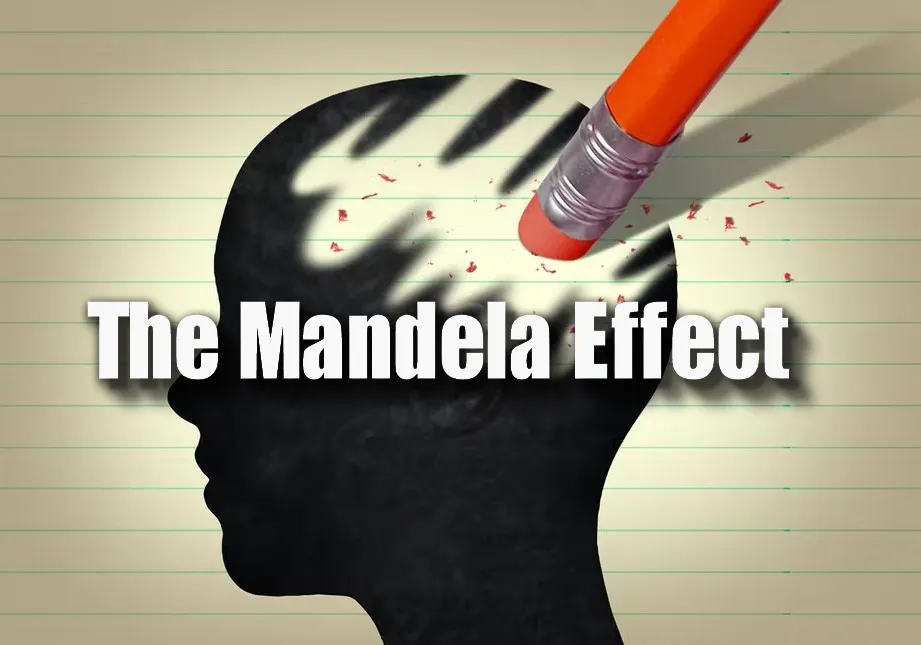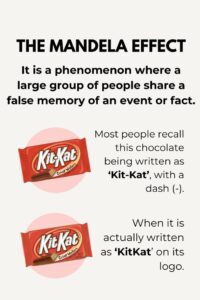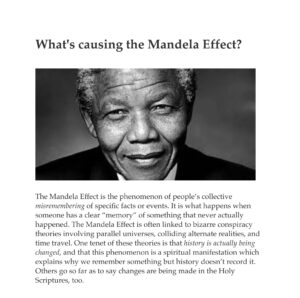
F Zaynah
Imagine this: you are recalling a childhood memory vividly, convinced it unfolded exactly as you remember. You tell a friend, only for them to look at you incredulously and say, “That never happened that way!” A chill runs down your spine. How could so many people remember the same thing incorrectly? Welcome to the mysterious world of the Mandela Effect, where reality sometimes feels like it bends, shifts, or plays tricks on human perception.

The term “Mandela Effect” was coined by Fiona Broome in 2009, inspired by a striking observation: countless people, including herself, remembered Nelson Mandela dying in prison during the 1980s. In reality, Mandela was released in 1990, became South Africa’s president, and passed away in 2013. Yet the sheer number of people who shared this false memory created a global curiosity one that bridges psychology, social dynamics, and the more speculative idea of parallel timelines.
Memory: A Trickster of the Mind
Our brains are not perfect recorders of reality. Each memory is reconstructed, often influenced by emotion, context, and external information. Psychologists call this confabulation, a natural process where the brain fills in gaps with details that feel plausible even if they never happened.
Consider the famous misquote from Star Wars: almost everyone remembers Darth Vader saying, “Luke, I am your father,” when the actual line is, “No, I am your father.” Why is it so widely misremembered? Because human memory is not merely personal it is social. Once a memory enters the collective consciousness, social reinforcement amplifies it. Forums, memes, and casual conversations transform tiny recollection errors into cultural phenomena.
When Time Feels Unstable
Beyond psychology, some enthusiasts believe the Mandela Effect hints at parallel universes or timeline shifts. Could there be versions of reality that slightly differ from the one we inhabit? Some report time slip experiences: sudden, disorienting flashes of memory that don’t match their current reality. One moment, a person recalls a logo with a cornucopia behind the Fruit of the Loom fruits; the next, research shows it never existed. Could this be a minor intersection with another timeline?
Take The Berenstain Bears, for instance. Millions recall it as Berenstein Bears, the minor difference in spelling igniting debates and curiosity worldwide. Even the Monopoly Man’s monocle, remembered by countless people though it never existed, feels like a small clue to some hidden truth, a glitch in the fabric of memory or perhaps the universe.
More Puzzling Examples
Movie Lines – Classic lines like “Mirror, mirror on the wall” (Snow White) are often misquoted; the correct line is “Magic mirror on the wall.”
Geography – Some insist that coastlines, borders, or country shapes have subtly changed over time.
Historical Events – Minor discrepancies in public recollection of major events continue to spark debate.
Brands and Logos – Popular logos are remembered differently by large groups, like the Ford logo, KitKat bar spacing, or the Monopoly Man’s monocle.
Each of these examples highlights a simple but profound truth: human perception is inherently subjective. Memory is not just fallible; it is malleable, influenced by countless social, emotional, and cognitive forces.
Real Life Implications
While some Mandela Effect examples are amusing, the phenomenon has serious consequences. Eyewitness testimonies, for instance, can be unreliable when collective memory distortions occur. Marketing campaigns sometimes unintentionally trigger Mandela Effect moments, subtly shaping consumer perception. Even education can be affected when students misremember “facts,” collectively altering understanding over generations.
The phenomenon also fuels philosophical debates: if memories differ so widely, what does that imply about reality itself? Are our experiences glimpses of one version among many? Or are they just errors of cognition amplified socially? Quantum theories and parallel universe speculation enter the conversation, offering both awe inspiring and unsettling possibilities.
Exploring the Mandela Effect Yourself
Curiosity is key. Here are ways to explore this mind-bending phenomenon:
Memory Journaling – Document your recollections over time, then verify against credible sources. Patterns may emerge.
Community Engagement – Online forums and discussion groups are treasure troves for shared false memories.
Mindful Reflection – Accept that memory errors are human. Being “wrong” doesn’t indicate weakness, only the brain’s complexity.
Notice the Unusual – Moments that feel like time slips or sudden anomalies in memory can be fascinating to explore.
Some enthusiasts even report physical sensations during time slips a momentary vertigo, a sense of déjà vu so strong it feels like crossing into an alternate timeline. Whether these experiences are neurological, psychological, or evidence of a multiverse remains unknown, but the allure is undeniable.
Why the Mandela Effect Captivates
The Mandela Effect combines science, psychology, and mystery in ways few phenomena can. It challenges the assumption of a fixed reality, illustrating the fragility and creativity of human memory. Every shared false memory becomes a thread in the complex tapestry of human consciousness, connecting individuals across time, space, and culture.

Speculation about parallel realities or time slips adds a thrilling sense of adventure. Even if the cause is purely cognitive, these stories awaken curiosity, wonder, and philosophical reflection. They remind us that our experience of reality may be less solid than we imagine, and that the world has hidden corners we are only beginning to glimpse.
Conclusion: Embracing the Mystery
The Mandela Effect is more than a quirky curiosity it is a journey into the mind’s astonishing capabilities and the uncertain nature of reality. Each misremembered event, each shared anomaly, challenges perception and invites exploration. Whether it originates from memory reconstruction, social reinforcement, or hidden timelines, the phenomenon teaches humility, wonder, and imagination.
In a world where reality sometimes feels like a shifting landscape, the Mandela Effect reminds us of the thrill of uncertainty. Our memories, simultaneously powerful and deceptive, reveal the richness of human cognition. Reality may not always be fixed, but our curiosity, awe, and willingness to explore these mysteries make the journey unforgettable.
The next time a memory refuses to align with evidence, pause and marvel. Could it be a simple brain error or a subtle brush with another reality? Either way, the experience is profoundly human, an adventure of perception, and a story our minds are eager to tell.